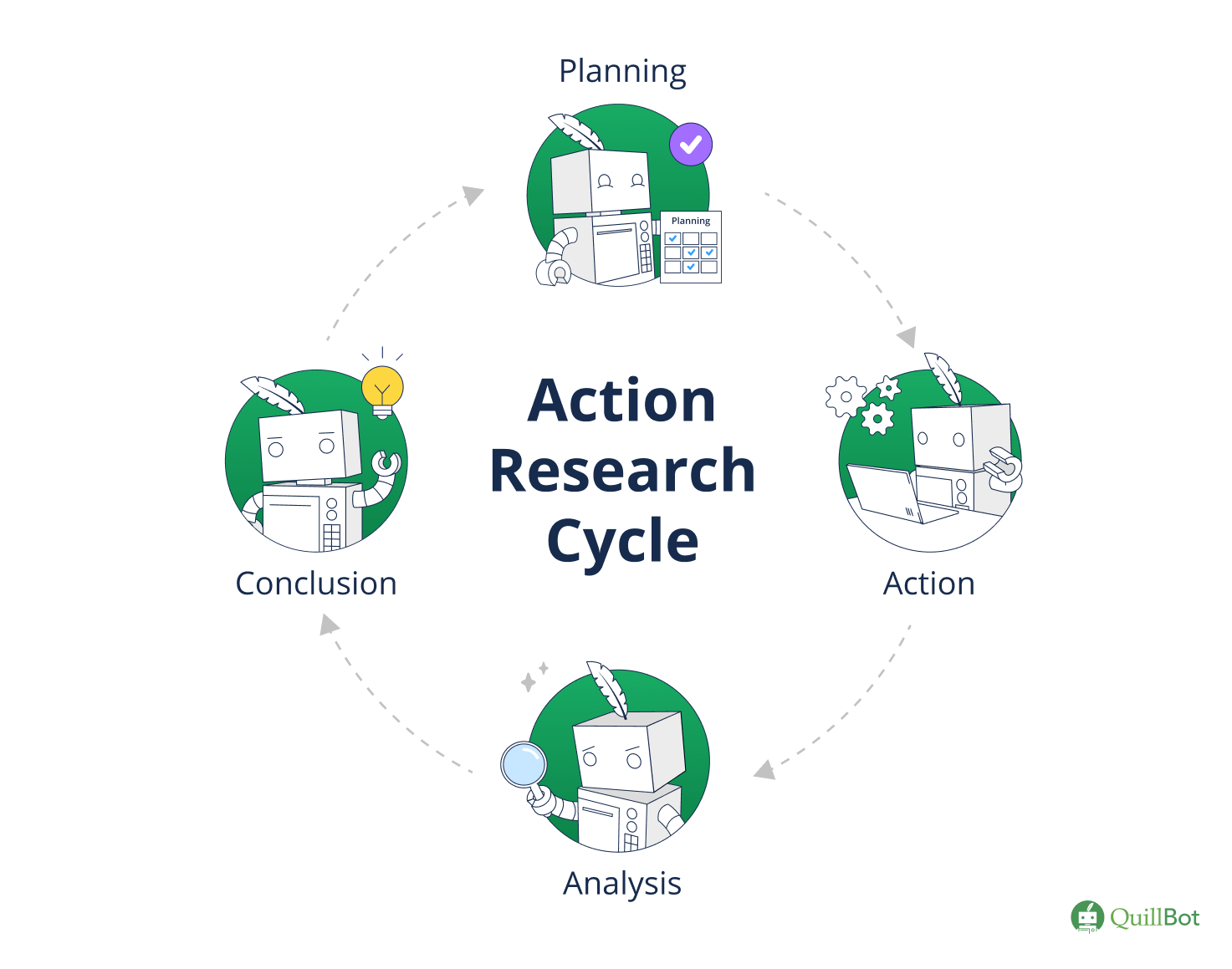What Is Action Research? | Examples & Definition
Action research is a research method that combines investigation and intervention to solve a problem. Because of its interactive nature, action research is commonly used in the social sciences, particularly in educational contexts.
Educators frequently use this method as a means of structured inquiry, emphasizing reflective practice and combining theoretical knowledge and practical application.
The term “action research” was first introduced in 1944 by Kurt Lewin, a renowned MIT professor. Due to its cyclical nature, action research is also referred to as the action cycle, action model, or cycle of inquiry.
Types of action research
There are two main types of action research:
- Participatory action research focuses on involving community members as active participants in the research process. This approach prioritizes empowering individuals within the community being studied, recognizing their valuable insights and experiences as integral to shaping the research outcomes.
- Practical action research centers on the methodology used to conduct research and its direct application to resolving specific problems or challenges.
Both participatory and practical action research aim to enhance the skills of future professionals rather than solely contributing to theoretical advancements.
Action research examples
Action research is frequently used in fields like education due to its flexibility and iterative nature.
Part-time staff members walked the researcher through their days and suggested where breaks and changes to the schedule would be most beneficial. The findings were shared with school administrators to execute the improvements.
The investigation revealed that modernized techniques and online, interactive tools were not being incorporated. The teachers resolved to implement more interactive, modernized teaching approaches to improve attendance.
Action research models
Action research approaches often draw upon three action research models: collaboration, critical reflection, and operational (aka technical).
- The collaboration model focuses on building a network of individuals with similar traits and collecting learning points through repeated feedback cycles.
- The critical reflection model examines existing systemic processes, seeking to understand why certain practices were developed and how they might be improved.
- The operational model typically involves a spiral process, such as planning, acting, observing, and reflecting.
Action research vs traditional research
Action research differs significantly from other types of research in its focus on producing actionable processes during the research process rather than contributing to an existing body of knowledge or drawing data-driven conclusions.
As such, action research is formative rather than summative in nature, and it’s conducted in an ongoing manner.
| Action research | Traditional research | |
|---|---|---|
| Method |
|
|
| Goal |
|
|
| Context |
|
|
Action research advantages
Action research has the following advantages:
- Action research offers immediate and practical solutions for pressing issues, avoiding complex, long-term remedies based on extensive data analysis.
- It is highly adaptable, so researchers can tailor their analysis to specific needs and implement practical, customized changes at the individual level.
- When conducted effectively, action research can empower participants and facilitate social change, enabling community members to drive meaningful transformations.
Action research disadvantages
- The flexibility of action research studies limits their generalizability and replicability, leading to concerns about the validity of findings and the overall theoretical rigor of the research.
- Ethical challenges may arise in structuring action research projects, as participants could feel pressured to take part or conform to certain expectations.
- High susceptibility to research biases, such as selection bias or social desirability bias, poses a significant risk in action research studies.
Frequently asked questions about action research
- What are examples of action research papers?
-
Examples of action research papers are:
- “Participatory Action Research for Conservation and Development: Experiences from the Amazon” by Perz et al. (2022)
- “Exploring Social Innovation through Co-creation in Rural India Using Action Research” by Cornet and Barpanda (2021)
- What is a list of topics for action research in education?
-
Topics for action research in education are:
- Developing a standards-based grading system to improve students’ understanding of assessment criteria
- Designing a technology-enhanced curriculum to improve student learning outcomes and engagements
- Developing a co-teaching model to improve student outcomes for students with special needs
If you’re looking for even more topic ideas, ask QuillBot’s AI Writer to generate a list of action research topics for you.
Cite this Quillbot article
We encourage the use of reliable sources in all types of writing. You can copy and paste the citation or click the "Cite this article" button to automatically add it to our free Citation Generator.
Merkus, J. (2025, November 26). What Is Action Research? | Examples & Definition. Quillbot. Retrieved December 6, 2025, from https://quillbot.com/blog/research/action-research/

